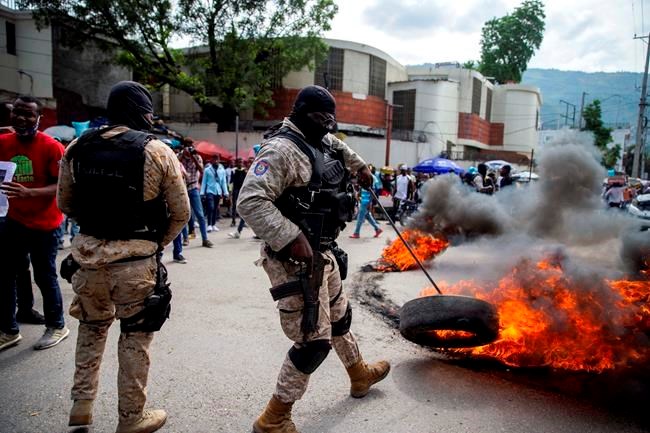PORT-AU-PRINCE, Haiti — Hundreds of protesters – many dressed in school uniforms – marched through the streets of Haiti’s capital Thursday to demand answers after the kidnapping and killing of a young woman that has incensed the nation.
High school senior Evelyne Sincère was found in a trash heap Sunday after relatives said they were unable to pay the large ransom demanded by her captors. Human rights groups contend the incident highlights the nation’s worsening security crisis.
“I am worried,” said Katy Jean-Joseph, 19, who marched while carrying a photo of Sincère. “What happened to Evelyne could have happened to me.”
Haiti has been rocked by street protests demanding President Jovenel Moise’s ouster on allegations that he mismanaged the economy and failed to hold accountable those who siphoned billions in international aid into bank accounts overseas. Now the Caribbean nation is also grappling with growing concern over Moise’s decision to delay legislative elections and instead insist first on a
International leaders including the Trump administration and the Organization of American States are pressuring Moise to set a date for a vote.
Meanwhile, the United Nations and rights groups in Haiti are warning about a rising tide of violence by armed gangs whose crimes are largely going unpunished in a country that has struggled to buoy its weak national police force.
The U.N. envoy for Haiti painted a grim picture to the U.N. Security Council last month, saying that the nation is “once again struggling to avert the precipice of instability.” Helen La Lime added that the Haitian National Police would need at least 10,000 well trained and equipped officers to meet international standards.
“Gangs continue to challenge the authority of the state, especially in the more populous
Nearly 2,000 protesters gathered Thursday in a
The protest ended after police used tear gas to disperse the crowd.
“I want to be able to succeed in my country, without fear, and have a normal life — not wake up in the morning and hear about a crime like what happened to Evelyne on the news,” said Nerley Charles, 21, a protester. “We need justice and an end to impunity.”
Police have not released details about the crime, but a local justice of the peace told the newspaper Le Nouvelliste that she had been beaten to death. A video showing Sincère’s sister wailing as the corpse was discovered sparked outrage on social media. She said kidnappers demanded $100,000, far more than the family could raise.
“I begged for mercy and said I’d bring the money,” Enette Sincère told reporters.
Several high-profile radio hosts announced they were
“Normally children bury their parents – only in times of war should a parent bury their child,” Prime Minister Joseph Jouthe wrote on Twitter. “But in Haiti we are not at war.”
The crime comes two months after a prominent lawyer, Monferrier Dorval, was shot to death at his home. La Lime said Dorval’s death “epitomizes for many the weak state of rule of law in the country.”
Civil society groups have recorded 162 kidnappings this year, including 21 in October. Fifty-five of the kidnapping victims were reported to be women.
“Women do become more vulnerable as this continues to deteriorate,” said Ellie Happel, director of the Haiti Project at New York University School of Law’s Global Justice Clinic.
Human rights lawyer Mario Joseph called the current situation a “state of terror” in which police do little to hold those responsible for crimes accountable. He pointed to a video circulating online Thursday purporting to show a former policeman wanted on an arrest warrant turning in Sincère’s boyfriend – but facing no apprehension himself.
Joseph said most recent kidnapping victims have been people known to have enough money to pay a ransom – not students from poor families like Sincère. It is unclear whether gangs may have been involved in the crime.
He added that the security crisis is fueling mounting distrust of authorities, some of whom have been implicated in a big corruption scandal involving funds from an oil assistance program. In areas known for gang activity and kidnappings around the capital, police have repeatedly failed to mount an active response, he said.
“There are nearby police stations and there hasn’t been any police intervention,” he said.
Evens Sanon, The Associated Press


